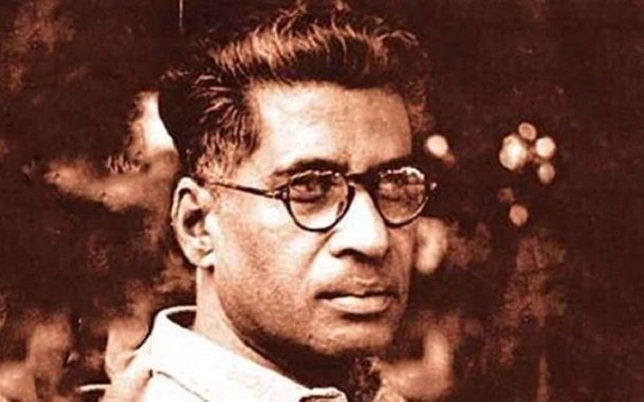Manabendra Nath Roy (1887 – 1954) was an Indian revolutionary, radical activist and political theorist, as well as a noted philosopher in the 20th century. Roy was a founder of the Mexican Communist Party and the Communist Party of India. He was also a delegate to congresses of the Communist International and Russia’s aide to China.
M. N. Roy was impressed by revolutionary movement of Islam. He delivered lectures on this topic in 1920 which arc published in a book ‘Historical Role of Islam’.
Contents
Islam’s Incredibly Fast Expansion
Commenting on the unbelievable expansion of Islamic world M.N. Roy says:
“One is simply amazed to contemplate the incredible rapidity with which the two mightiest empires of the ancient time were subverted by the comparatively small bands of nomads issuing from the Arabian desert, fired with the zeal of a new faith.
Hardly fifty years had passed since Mohammad assumed the role of the singular Prophet spreading his Message of Peace at the point of the sword, his followers victoriously planted the banner of Islam on the confines of India, on the one side, and on the shore of the Atlantic, on the other.
The first Khalifs of Damascus reigned over an Empire which could not be crossed in less than five months on the fleetest camel.
At the end of the first century of the Hegira, the “Commanders of the Faithful” were the most powerful rulers of the world.
Muhammad is the most Successful Prophet Ever
“Every prophet establishes his pretension by the performance of miracles. On that token, Mohammad must be recognized as by far the greatest of all prophets, before or after him: The expansion of Islam is the most miraculous of all miracles.”
Islamic Empire vs other Empires of the World
“The Roman Empire of Augustus, as later enlarged by the valiant Trajan, was the result of great and glorious victories, won over a period of seven hundred years. Still, it had not attained the proportions of the Arabian Empire established in less than a century.
The Empire of Alexander represented but a fraction of the vast domain of the Khalifs.
For nearly a thousand years, the Persian Empire resisted the arms of Rome, only to be subdued by the “Sword of God” in less than a decade.
Islamic Revolution: Arabs Before and After
“Let a modern historian describe the miracle of the rise of Islam. “Nowhere was there a vestige of an Arabian state, of a regular army, or of a common political ambition. The Arabs were poets, dreamers, fighters, traders; they were not politicians.”
Nor had they found in religion a stabilizing or unifying power. They practiced a low form of polytheism…
A hundred years later, these obscure savages had achieved for themselves a great world power.
They had conquered Syria and Egypt, they had overwhelmed and converted Persia, mastered Western Turkestan and part of the Punjab.
They had wrested Africa from the Byzantines and the Berbers, Spain from the Visigoths.
In the West they threatened France, in the East Constantinople.
Their fleets, built in Alexandria or the Syrian ports, rode the waters of the Mediterranean, pillaged the Greek islands and challenged the naval power of the Byzantine Empire.
Their success had been won so easily, the Persians and Berbers of the Atlas Mountains alone offering a serious resistance, that at the beginning of the eighth century it must have seemed an open question whether any final obstacle could be opposed to their victorious course.
The Mediterranean had ceased to be a Roman lake.
From one end of Europe to the other, the Christian states found themselves con fronted with the challenge of a new Oriental civilization founded on a new Oriental faith.
No Revolution can Compete with Islamic Revolution
“Vulgar interpreters of the Islamic history lay stress upon its military achievements either to praise or to deprecate its far-reaching revolutionary significance.
If the undoubtedly brilliant military conquests of the Saracens were the only measure of the historic role of Islam, then it would not be a unique historical phenomenon.
The depredations of the barbarians of Tartary and Scythia (Goths, Huns, Vandals, Avars, Mongols etc.) approximated, if not equalled or excelled, their military accomplishments.
But there is a vast difference between the tidal waves that occasionally rolled West, South and East, from the border land of Europe and Asia, and the Arabic eruption of religious frenzy.
Like tidal waves the former rolled on in their cataclysmic greatness, only to subside, sooner or later, having distributed death and destruction, far and wide.
Latter, on the contrary, was an abiding historical phenomenon, which ushered in a brilliant chapter of the cultural annals of mankind. Destruction was only a subsidiary part of its mission.
It pulled down the played – out old, to construct a necessary new.
It demolished the holy edifices of the Cesars and the Chosroes, only to rescue from their impending ruin the accumulated treasures of human knowledge, to preserve and multiply them for the benefit of the posterity”.
People Should Study Islam
“The prodigious feats of the Saracen horsemen are not the only distinctive feature of Islam. They simply captivate our attention which must marvel at them, and impel us to search out and admire the causes of such a tremendously dynamic historical phenomenon.
The miraculous performance of the “Army of God” usually dazzles the vision and the more magnificent achievements of the Islamic revolution are seldom known to the average student of history, even if he be a follower of Mohammad.
Islam did Great Service to Humanity
“Yet, the martial victories of the followers of the Arabian Prophet were but the prelude to a more magnificent and lasting performance in the social and cultural fields.
They only created the conditions for political unity which opened up an era of economic prosperity and spiritual progress.
The stupendous ruins of the Roman and Persian Empires had to be cleared away so that a new social order could rise with new ideas and new ideals.
The dark superstition of the Magian mysticism, and the corrupt atmosphere of the Greek Church vitiated the spiritual life of the subjects of the decrepit Persian and Byzantine Empires rendering all moral and intellectual progress impossible.
The severe monotheism of Mohammad wielded the formidable scimitar of the Saracen not only to destroy the profane idolatry of the Arabian tribes; it also proved to be the invincible instrument of history for freeing a considerable section of mankind from the eternal evil spirit of Zoroaster as well as from degenerate Christianity given to the superstition of miracle-mongering, to the deadly disease of monasticism and to the idolatrous worship of Saints.
The amazing achievements of Saracen arms only prove that they were wielded at the service of history — for the progress of humanity.
The phenomenal success of Islam was primarily due to its revolutionary significance and its ability to lead the masses out of the hopeless situation created by the decay of antique civilizations not only of Greece and Rome but of Persia, China and India.”

